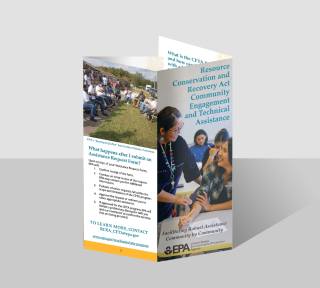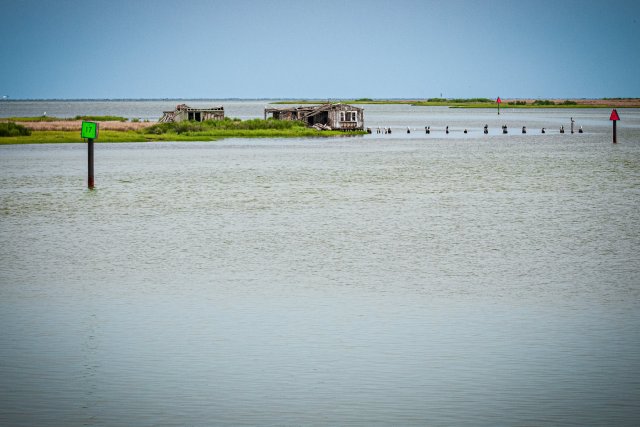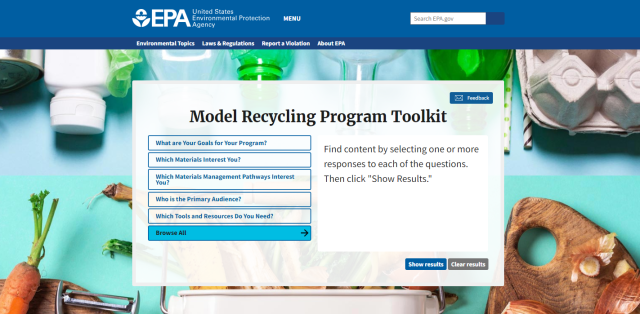ORCR Annual Accomplishments
The mission of EPA’s Office of Resource Conservation and Recovery is to protect human health and the environment by promoting the conservation of resources, ensuring proper waste management, preventing harmful exposure, and overseeing the cleanup of land for productive use. We do this by establishing and implementing regulatory standards, incentive-based programs, and best practices in collaboration with communities, governments, businesses, and other organizations. ORCR implements the Resource Conservation and Recovery Act.
Fiscal Year 2023 Accomplishments Report
The FY23 Accomplishments Report details major actions taken by ORCR from October 1, 2022, to September 30, 2023 to advance our mission. Read through the FY23 ORCR Accomplishments Report (pdf) .
Below are some highlights from the report. Check out the full report for all of ORCR's accomplishments for FY23.
- Prioritizing and Organizing Around Environmental Justice
- Creating More Resources to Educate Partners about Climate Adaptation
Prioritizing and Organizing Around Environmental Justice
Throughout FY 2023, we made substantial strides in our commitment to advancing the principles of EJ and supporting the President’s Executive Orders and the Administration’s strategic goals. ORCR has 13 projects in the ORCR EJ Action Plan, of which nine projects are also included in the OLEM EJ Action Plan. Among these projects are tools that EPA Regions can use to integrate EJ considerations into their work.
ORCR’s Environmental Justice Work Group ensures continuous oversight of our progress on these projects and assists with the organization and presentation of monthly updates. One notable achievement of the work group in FY 2023 was the launch of the monthly EJ Moment for ORCR. Its purpose is to help staff develop insights to foster a deeper comprehension of what EJ entails and how it impacts people and communities.

We also achieved a significant milestone with the development of the Good Governance Technical Assistance Tool. We piloted this innovative tool during FY 2023, specifically as part of a CCR outreach event, and refined the tool based on feedback from its practical use. The core objective of the Good Governance Project is to provide the public with effective points of contact to address their concerns, whether they are in or outside RCRA’s purview. When possible, people are directed to contacts at organizations with jurisdiction over their specific issues. The scope of the Good Governance database is extensive. It has 1,277 state, federal, and interagency contacts along with 111 technical assistance tools spanning various environmental health and public needs areas, such as flooding, spills, emergency response, coal ash, and climate change, among others.
We also launched the RCRA Community Engagement and Technical Assistance Program. It assists communities, addressing environmental and health concerns related to waste management by providing contractor support, resources, and information assistance. These services empower communities to develop informed opinions and conduct independent analysis about their RCRA waste-related concerns. Community engagement and technical assistance services range from providing support for community meetings to compiling summary information of technical and scientific documents in plain language. In addition, the program supports grassroots participation and fosters a collaborative working space for EPA and communities.
ORCR also worked with EPA Regions and the Office of General Counsel to develop draft guidance on how to consider EJ and climate change impacts in the RCRA permitting and PCB approval processes. These draft guidance documents will be published for public comment in FY 2024.
In addition, we prioritized the development of EJ guidance to ensure state activities address EJ concerns. We formed a work group comprising EPA headquarters and regional staff to explore potential revisions of RCRA hazardous waste state grant terms and conditions to better prioritize and support state activities to address EJ concerns. We developed draft guidance to provide direction to regional offices and states about including requirements and commitments in state grant workplans to incorporate EJ concerns. EPA engaged with and informed states about our progress. The guidance will be available to EPA Regions to incorporate into FY 2025 work plans, which will be negotiated during FY 2024.
Creating More Resources to Educate Partners about Climate Adaptation
In FY 2023, ORCR stepped up investment in climate change work by bringing a Senior Climate Advisor onboard for a one-year detail and launching a national RCRA and PCBs Climate Change Team. Together with OLEM’s Climate Coordinating Committee, ORCR climate change staff completed training for internal staff, developed a new set of climate change webpages for release in FY 2024, and collaborated on two pilot RCRA climate vulnerability assessments. We successfully completed all FY 2023 climate adaptation implementation plan commitments, developing a memorandum on how to incorporate climate change into the RCRA corrective action process, and helping two municipalities and three Tribes develop disaster debris management plans. We developed two more memos on ways to consider potential adverse climate change impacts in the hazardous waste permitting process and incorporate climate change resilience measures into PCB approvals. Finally, we presented 12 times to our partners on current climate work, including outreach to industry and regulators on the new Sea Level Rise Visualization Tool.

All 56 States, Territories, and the District of Columbia Applied for Bipartisan Infrastructure Law Funding
On November 15, 2022, the first anniversary of the Bipartisan Infrastructure Law, ORCR announced two new Requests for Applications: the Solid Waste Infrastructure for Recycling for Communities funding opportunity (or SWIFR for Communities), and the Recycling Education and Outreach grant program. The Bipartisan Infrastructure Law established and funded these programs. On the same day, ORCR launched the Model Recycling Program Toolkit, a new searchable web application that shares EPA tools and resources on recycling, composting, reuse, and other materials management activities. With this toolkit, the public can find a range of resources, including case studies from communities that have created effective recycling, composting, reuse, and repair programs as well as training materials on how to create messages that drive behavior change.

On January 4, 2023, ORCR’s Resource Conservation and Sustainability Division announced the SWIFR funding opportunity for Tribes and Intertribal Consortia to invest in the health, equity, and resilience of Tribal nations and their communities. ORCR also announced a SWIFR funding opportunity for states and territories. All 56 states, territories, and the District of Columbia applied for and were awarded funding by the end of FY 2023.
